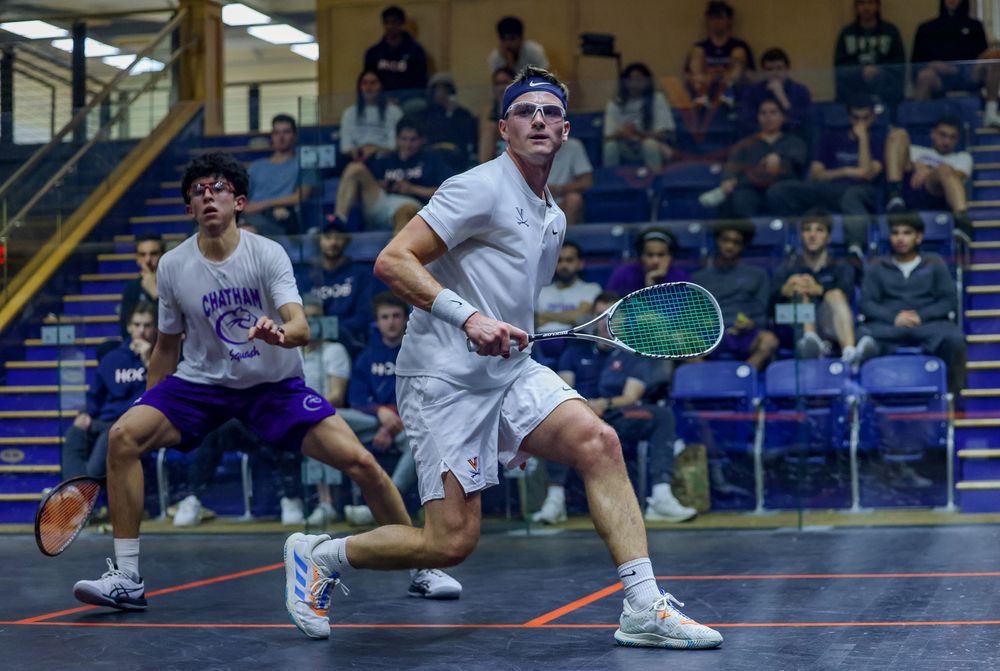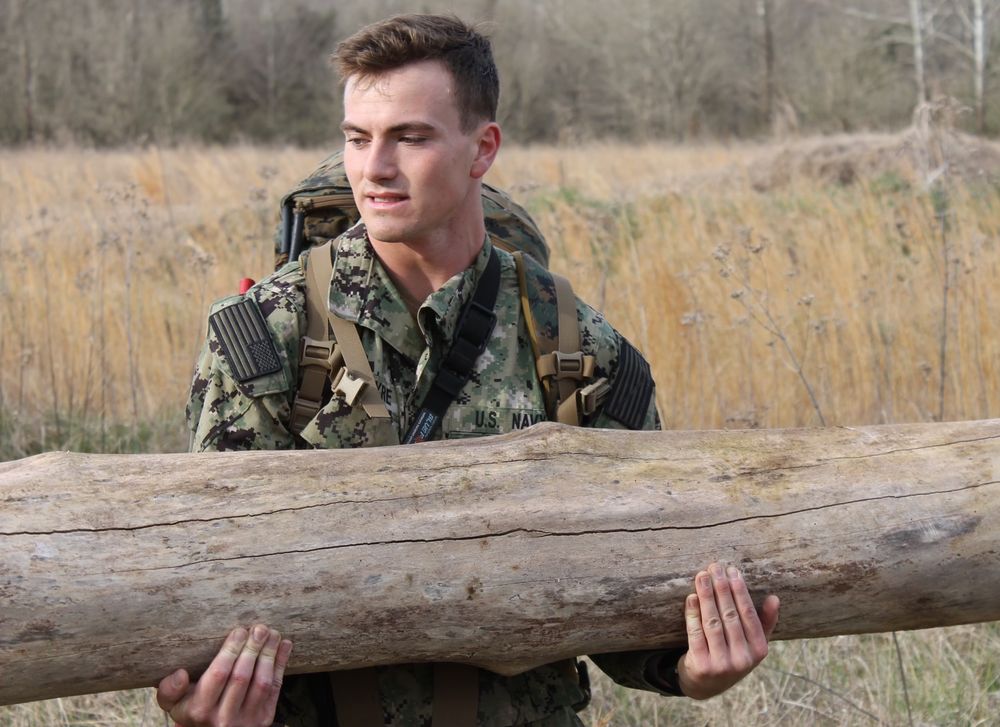McIntyre Following Arduous Path Toward Navy Career
By Jeff White (jwhite@virginia.edu)
VirginiaSports.com
CHARLOTTESVILLE, Va. — When he meets with potential recruits, University of Virginia head squash coach Mark Allen shares with them examples of different class schedules, including those of players who, by enrolling in summer or J-term courses, are able to carry lighter loads during a season that spans the fall and spring semesters.
“My conversation with recruits is very much, ‘It’s up to you what you want to do. If you want that time frame, this is what a light schedule looks like,’ ” Allen said. “But then I tell them, ‘If you’re someone who likes to stay busy and really wants to challenge yourself, this is what a heavy schedule looks like.’ And I pull up Myles’ schedule.”
That would be Myles McIntyre, one of the co-captains of the UVA men’s team. McIntyre, a fourth-year student who’ll graduate in May with a bachelor’s degree from the Frank Batten School of Leadership and Public Policy, has been part of the University’s Naval ROTC program since January of his first year on Grounds.
“If someone wants to fill every hour of every day, you can do that,” Allen said, “and Myles is one of those guys who’s crammed a tremendous amount into his four years here.
“He marches to the beat of his own drum. He knows what he wants. He’s very independent and has been independent from the moment he arrived here … His success as an athlete stems a lot from that.”
McIntyre, who also has held a part-time job at UVA, said his balancing act can be challenging.
“It ebbs and flows,” he said. “When squash is in full season, it’s probably the toughest part. It’s challenging, but both bring different things to the table for me. Squash is very team-oriented. It’s almost a release for me. It’s something I’ve played my whole life. I love playing the game, and it’s more just fun for me, which is great. The group of guys, they’re like a family to me now.
“And then ROTC is more like, OK, that’s my job. So I take it really seriously. I’m always growing there. I try to act as a sponge to soak up as much information as I can before I commission, whereas squash is kind of like, OK, I’ve been there, I know what I’m doing now. I can just enjoy it.”
Upon graduation, he’ll be commissioned as an ensign in the U.S. Navy. McIntyre plans to spend part of the summer in Charlottesville, working at the NROTC unit on Grounds and, when his schedule permits, assisting the Cavalier squash program. All the while he’ll continue training for an opportunity to reach a lofty goal.
McIntyre, who turned 22 this week, wants to become a Navy SEAL, and later this year he’ll start the legendarily grueling Basic Underwater Demolition/SEAL school in Coronado, Calif.
“And then, contingent upon my completion of BUD/S, I’ll proceed with SEAL training to hopefully be a part of that community,” said McIntyre, who completed the Seal Officer Assessment Selection (SOAS) screening program in Coronado last summer.

Myles McIntyre
McIntyre, who grew up in New England, came to UVA from St. Paul’s School in Concord, N.H., where his academic advisor for his senior year was Kevin Brooks. A graduate of the U.S. Naval Academy, Brooks flew F/A-18 jets during his 20 years in the Marine Corps.
His relationship with Brooks, who was a major in the Marines, piqued McIntyre’s interest in the military and stoked his desire to serve his country.
“My whole life. I’ve wanted to help people,” McIntyre said. “When I was younger, I remember getting up in front of my class when we were asked, ‘What do you dream of being?’ I was just like, ‘I just want to help people, I guess.’ ”
During a rocky stretch in his parents’ marriage, McIntyre said, he devoted significant time to taking care of his two sisters, “and through that, I realized how fortunate we were, that even though we had a troublesome parent dynamic, we could get through that.”
Moreover, as a junior squash player he traveled abroad extensively to compete in tournaments. McIntyre said that experience “opened my eyes to how special this country is. And although it’s not perfect, we should all be honored that we have the privileges we have in the United States. And so that was really what kicked it for me. I was like, I want to be part of a team where I can support people like I did with my sisters. It’s where I feel comfortable. I like helping people. And then secondly, we need to protect this country that we’re part of. I’ve been given privileges that other people in this country don’t have and I think that it’s my duty to return the favor by serving and then hopefully bettering our country in protecting it for the future.”

Brooks, who teaches humanities at St. Paul’s, said he remembers occasional conversations with McIntyre “about my time in the Marine Corps and about military service. While I don’t find it surprising that that’s something he is actively pursuing, I didn’t necessarily think when I was having conversations with him during his senior year that it was a priority for him. But I do remember having good conversations with him about college, about life beyond college, about my decision to go to the Naval Academy and my decision to go into the Marine Corps and to pursue a career in aviation. He was always a keen listener and asked good questions, thoughtful questions about it.”
They’ve continued to talk periodically since McIntyre left St. Paul’s, Brooks said, and “he told me that he was getting more and more interested in the idea of military service, and we had some good conversations about that. Myles is a very hard-working young man, he’s very introspective and thoughtful and really thinks deeply about what he’s doing and why he’s doing it and what motivates him and what he wants out of life and out of various different experiences.”
Brooks said McIntyre “already embraces or embodies some of the important traits of leadership. He’s resilient as well as being driven and persistent, which is very important, whether it’s in a military setting or in any other leadership setting. I think that Myles responds well to constructive criticism and feedback. He’s coachable, so to speak, and that’s important for leaders at all levels. And I think that he’d adaptable. He’s willing to work hard to try to figure out what the best plan is for any given aspect of his life, but then to modify or alter that plan as challenges arise or as different desired outcomes arise.”

McIntyre picked up squash when he was about 5. His father played and introduced him to the sport. McIntyre struggled in his first tournament—“I lost in straights every single match”—and that motivated him to improve.
“I was like, ‘Oh, shoot, I really want to beat some kids now,’ ” McIntyre recalled. “So that’s when I started taking it a little bit more seriously. I started playing more.”
He established himself as one of this country’s top young players, and in the summer of 2019 he represented the United States at the World Junior Championships in Malaysia. McIntyre enrolled at UVA a year later, but with the COVID-19 pandemic ongoing, the 2020-21 season was canceled.
A second-team All-Mid-Atlantic Squash Conference selection as a sophomore in 2021-22, when he posted a record of 12-2, McIntyre was 10-3 in 2022-23. He’s 6-4 this season, when he’s primarily played No. 3 in the Wahoos’ lineup.
“Myles is fierce competitor,” Allen said, “and you get the feeling that if he wasn’t playing squash, he’d have done something like boxing or some kind of martial art or fighting, because I think he gets something from being in that close space, one-on-one with another guy, where it’s me or you. He’s driven by that.”
The Hoos close the regular season with two matches this weekend at the McArthur Squash Center at the Boar’s Head Resort: Saturday against Princeton and Sunday against Cornell. The College Squash Association national championships begin Feb. 29 in Philadelphia.
His squash experience at UVA has been rewarding in multiple ways, McIntyre said. “One of them is just the family aspect,” he said. “These [teammates] are really, really solid guys. I’m sure that’s across the board on all teams, but I’ve become brothers with these guys. I’m living with them, and there’s something special about playing a college sport and suffering together, going through group suffering and then, hopefully, group success.
“Secondly, the facilities and the whole UVA athletics [department] that’s there to support us, it’s pretty impressive. I had no idea going in that it was going to be as supportive as it is. It makes me want to play for the school.
“And then lastly, I think Virginia, unlike some of the other big state schools, has such a good balance [for student-athletes]. I have my friends who are outside of athletics and my friends inside of athletics. I’m really grateful now, looking back on it, that I’ve been able to have the time and have the resources to make those relationships outside of squash, but then also have a full student-athlete experience in college.”
To receive Jeff White’s articles by email, click the appropriate box in this link to subscribe.

